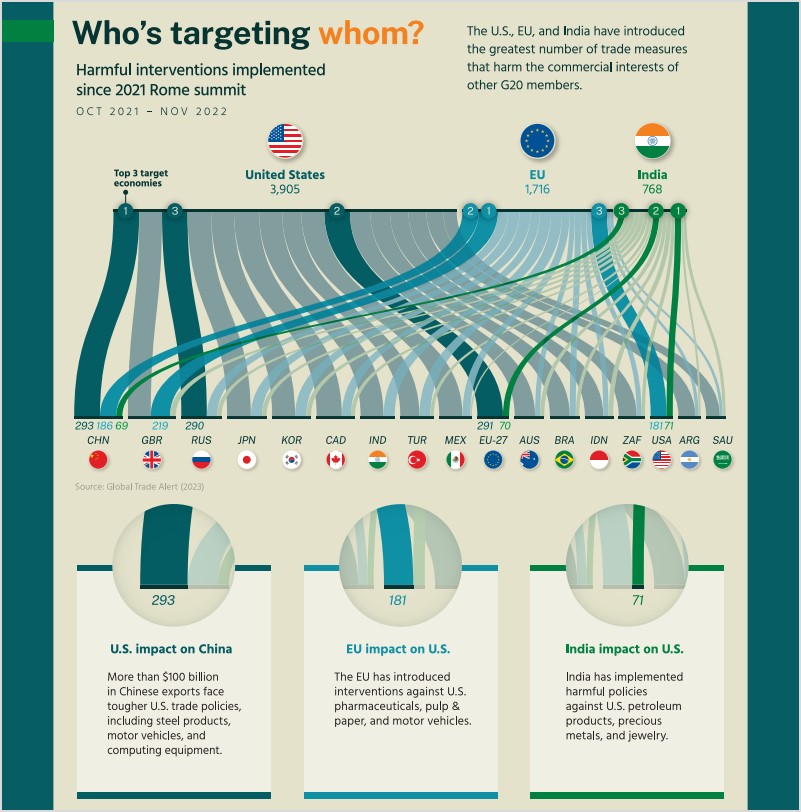Published 16 May 2023
Since the 2021 Rome Summit, nearly every G20 member has adopted a more protectionist trade policy mix. Policies that favor local companies over foreign investors have become rampant throughout the world's biggest economies. Data artists Visual Capitalist draw the trend in this first of our new three-part series on the age of trade fragmentation.
(Text by Chuin Wei Yap)
Protectionism has become the hallmark of trade policy worldwide. In the 12 months to November 2022, bookmarked by the Rome and Bali summits of the Group of 20 nations, trade restrictions across the group were more than triple the level of liberalizing measures, according to the G20 Trade Policy Factbook by Global Trade Alert, a database run by the Switzerland-based St. Gallen Endowment for Prosperity Through Trade.
The G20 is a pivotal group. Collectively, its members represent 19 among the world’s largest economies, comprising 85% of global gross domestic product, 75% of its trade, and two-thirds of the world’s population. Since the pandemic ebbed, governments have been lifting some protectionist measures but policies that favor local companies over foreign investors remain rampant.
We asked Vancouver-based Visual Capitalist to illustrate the trend. As Visual Capitalist depicts in this representation of GTA’s work, the developed economies of North America along with – perhaps less surprisingly – Russia were among the world’s biggest implementors of protectionist interventions last year.
Driven by US-China trade tensions and sanctions on Russia, US interventions knocked it down six places in GTA’s ranking of economies by their level of trade restrictions. Canada’s trade restrictions covered some 99% of its trade, making it the most interventionist economy in the G20 last year, GTA said.
The North American involution stands out. By the St. Gallen Endowment’s count, “the GTA dataset records 293 harmful interventions implemented by the United States since the Rome Summit that impair Chinese commercial interests [and] 291 harming the EU.”
Notably in the US and elsewhere, corporate subsidies have become the largest class of policy interventions. Subsidies have always been the favored instrument for protectionism, annually featuring in at least two-thirds of restrictive interventions G20-wide since 2018.
Such subsidies became all the rage among governments when the pandemic hit. But policymakers have been loath to let them go as geopolitical rivalry brings industrial policy back in vogue around the world.
But other types of trade restrictions are becoming popular too. “Buy national” procurement incentives rose to 10% of the G20-wide policy mix last year, up from 7% in 2021. Tariffs rose by a similar margin in the period.
The overall trend is worrisome. The G20 has a high stake in an open world trading system – not least because of G20 members’ sharply rising exposure to each other’s trade policies. Last year, some 51% of G20 merchandise exports were vulnerable to trade measures taken by the group’s members, double the level a decade ago, GTA data shows.
Among the most sobering findings: the overwhelming brunt of harmful interventions, representing some 90% of covered trade, were borne by exporters from liberal or electoral democracies – not by those from autocracies.
Perhaps aptly, Visual Capitalist chose to illustrate the GTA’s key findings in a shape evocative of the Japanese artist Hokusai’s iconic woodblock image ‘The Great Wave off Kanagawa’.
It’s a storm-tossed sea out there. Caveat emptor, caveat subscriptor.
© The Hinrich Foundation. See our website Terms and conditions for our copyright and reprint policy. All statements of fact and the views, conclusions and recommendations expressed in this publication are the sole responsibility of the author(s).







